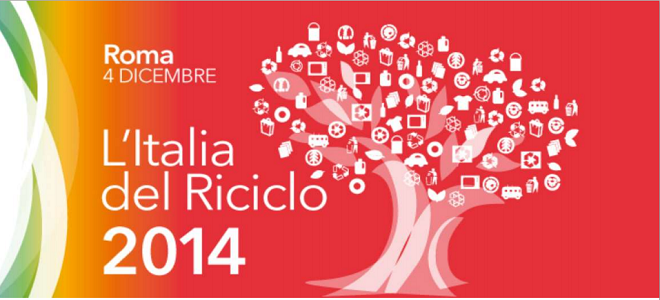In Italy, the green economy sector has grown in the last 5 years: the number of workers employed in the industry has increased (+13%), as has the number of companies involved in the waste management segment (+10%), 94% of which perform recycling activities. The total volume of sales generated by the sector is almost 34 billion euro. The operators in the sector are mainly comprised of small businesses, and the number of companies is increasing, while the number of sole traders is on the decline.
The total turnover of waste recycling companies has reached 34 billion euro. The added value generated amounts to a total of around 8 million euro, more than 0.5% of the GDP.
Regardless of the impact the crisis is having on the international markets and on consumption, the uncertainty created by the legislative framework and the inadequacy of the markets destined to receive the recycled materials, the business of recycling packaging materials continues to grow (+1% in 2013). Furthermore, it sustains many of the industrial sectors (iron and steel, furniture, paper, glass) that are strategic for our country.
This is the overall vision of the current scenario portrayed by “Recycling in Italy”, an annual report presented on 4th December in Rome, sponsored and drawn up by FISE UNIRE (the Confindustria association that represents companies in the waste recycling industry) and by the FONDAZIONE SVILUPPO SOSTENIBILE, in collaboration with the National Consortia for the Recovery and Recycling of Packaging.
In addition to probing into the dynamics of the various recycling production chains, the report also provides a snapshot of the economic and financial dimensions of the sector over the last few years (2008-2012). The turnover of waste recycling companies has today reached 34 billion euro. The added value generated amounts to a total of around 8 million euro, equal to more than 0.5% of the total GDP. There are over 9,000 waste recycling companies in Italy, most of which are small businesses with less than 10 employees. The number of these has increased by more than 10% in 5 years.
The number of employees engaged by the companies that performed waste recycling as their main line of business increased by 13% between 2008 and 2012. This increase goes against the general trend in the manufacturing industry, which instead registers a negative net business birth rate (-11%). In 2013, the recycling of packaging materials registered an overall increase (+1% overall) attesting to the resilience of the sector: 7.633 million tonnes compared with the 7.562 registered in 2012 and the 7.511 registered in 2011.
The increase is clear in all the production segments that display levels of excellence in the data on recycling paper (86%), steel (74%) and glass (65%). Instead, the quantities of material obtained from the recovery and demolition of scrapped vehicles sent for reuse, the recycling and recovery of energy and the national per capita average of waste from electrical and electronic devices, have all decreased: for the latter, although the data available (3.8 kg/person) is only slightly lower than the current target of 4 kg/ person, it is still a long way away from the much more ambitious targets established by the new directive which has just been implemented in Italy.
Regarding the recovery of inert waste from construction and demolition (39.8 million tonnes, equal to a recovery rate of 69%), the lack of available data on the actual production of the same means that it is not possible to assess whether the target (70%) has effectively been met. On the other hand, in the recovery of textiles (in 2013 110,900 tonnes, equal to a national average of 1.8 kg/person) there is still a great deal of space for further increases.
So, the general outlook for the growth of the recycling sector is generally positive, both nationally and on a European level. Indeed, it has been estimated that waste prevention, ecodesign, reuse and similar measures can generate an additional saving of 600 billion euro and reduce greenhouse gas emissions by from 2% to 4%. Fulfilling the new waste objectives would create around 600,000 new jobs. The proposed measures envisage 70% of urban waste and 80% of packaging waste being recycled by 2030 and, starting from 2025, a ban on disposing recyclable waste in landfills.
There is still a long way to go in order to remove the elements that prevent us from recycling. According to the president of Unire, Anselmo Calò, we are still waiting for the authorities to issue too many overdue decrees and regulations: these include the decree on the collection criteria, the End of Waste criteria, the guidelines for the issuance of the authorisations, the standards for processing several specific types of waste and the procedure for preparing waste for reuse.
The waste recycling industry in Italy could grow, generating new investments and new jobs, but in order for this to happen, the country needs a clear set of regulations that define the terms and conditions under which recycled waste ceases being waste and becomes a product.
“While awaiting the European regulations – comments Edo Ronchi, president of the Foundation for Sustainable Development – the Ministry for the Environment should put us in a position to proceed by issuing a Decree that at least establishes the characteristics and conditions for all types of non-dangerous waste that can be fully recycled, and which allow us to assign the End of Waste status to the element, by applying the European criteria”. In Ronchi’s view, this Ministerial Decree could be drafted in the space of three months by an ad hoc technical committee.
To reinforce the recycling industry and make up for the delays in some areas, especially in the south, where inadequate levels of waste management are still present, the Associations promoting the report state that it is essential to discourage people from disposing of waste in landfills, change the current method of calculating the cost of waste disposal from a rate based on estimates to one based on the actual quantity of waste conferred, distinguish recycled waste from non-recycled waste and at the same time promote products obtained using recycled materials.
Here are the presentations by Edo Ronchi – President of the Foundation for Sustainable Development and Marco Botteri of Ecocerved.

